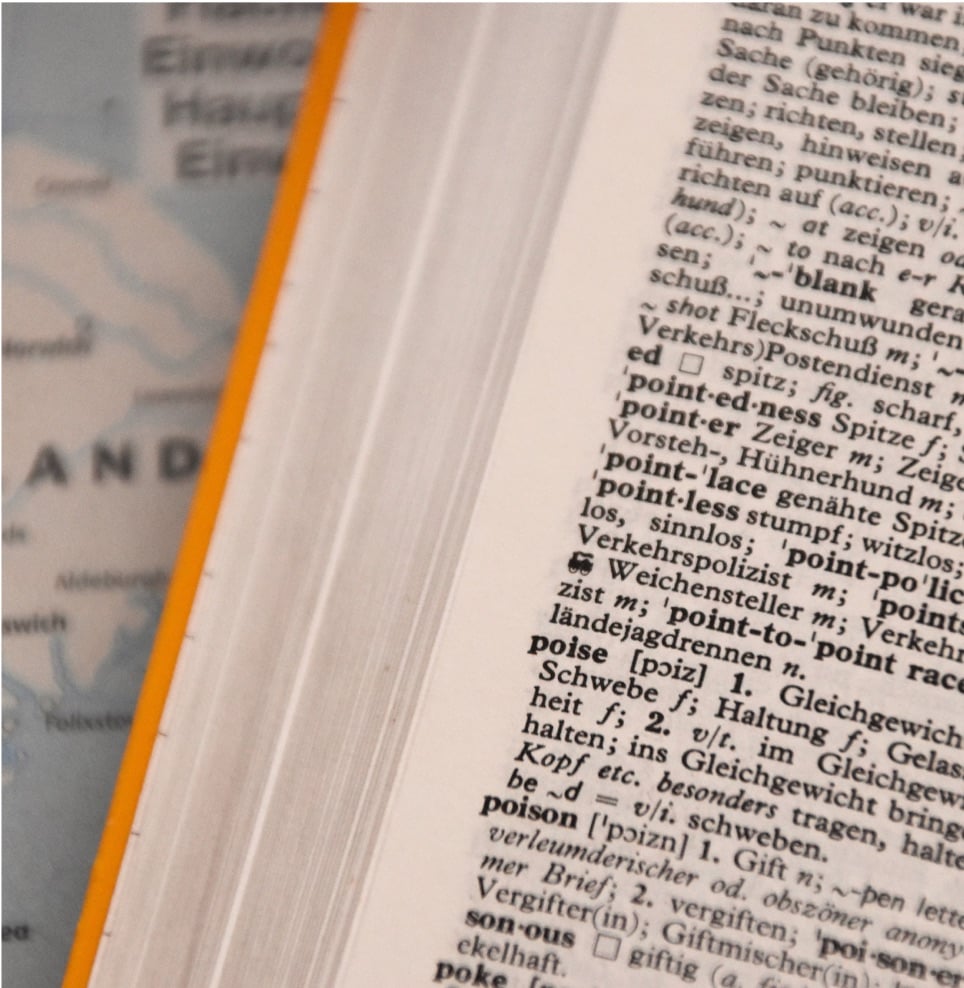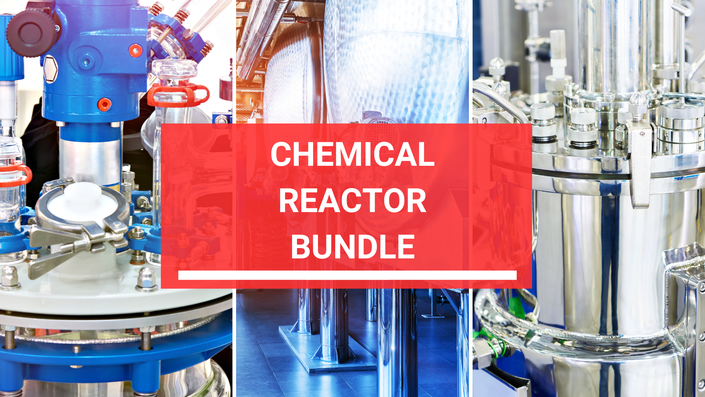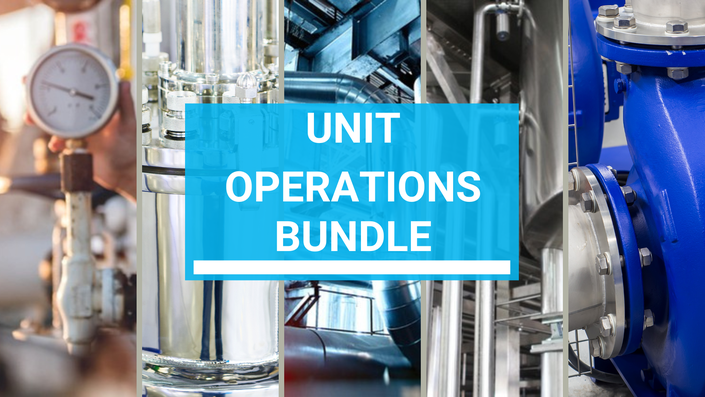Course Trailer
About this Course
📚 This CRE I.A - Rate Laws and Stoichiometry Tables for Reactors course covers the essential tools for designing and analyzing industrial reactors in chemical reaction engineering. You will master rate laws and stoichiometry tables, learning how to apply these concepts to predict reactor performance and optimize chemical reactions in industrial settings.
Key topics covered include:
- Fundamentals of Rate Laws
- Stoichiometry Tables for Reactors
- Application of Rate Laws in Reactor Design
- Reaction Mechanisms and Rate Constants
- Balancing Material and Energy in Reactors
- Analysis of Reactor Performance Using Rate Laws and Stoichiometry
👨🏫 Designed for
Chemical engineering students, process engineers, and professionals in the field of chemical reaction engineering who want to gain expertise in the fundamental principles of rate laws and stoichiometry as they relate to reactor design and performance analysis.
📚 Course Approach
This course blends theoretical concepts with practical applications, offering real-world examples and case studies to illustrate the use of rate laws and stoichiometry tables in reactor design. You will gain hands-on experience in solving practical reactor design problems using these essential tools.
🎯 By the end of the course, you will be able to:
- Understand the principles behind rate laws and stoichiometry tables
- Apply rate laws to predict and analyze reaction rates in reactors
- Use stoichiometry tables to balance chemical reactions and optimize reactor performance
- Design reactors based on reaction kinetics and material balances
- Solve practical problems related to rate laws, stoichiometry, and reactor performance
🚀 Recommended for
Students, process engineers, and professionals who are new to or looking to enhance their knowledge of rate laws, stoichiometry, and their application in reactor design and analysis.
✅ You’ll learn to:
- Derive and apply rate laws for different types of chemical reactions
- Construct and use stoichiometry tables for reactor design and analysis
- Solve material and energy balances in reactors based on rate laws
- Optimize reactor designs using fundamental reaction kinetics and stoichiometric principles
- Analyze reactor performance and troubleshoot potential design issues

Self-Paced, Dynamic Lectures
Learn at your own pace, anytime and anywhere.
The lectures are concise, engaging, and focused—designed to maximize your understanding efficiently.

Essential
Mastering Core Principles of Reactor Rate Equations and Stoichiometry for Chemical Engineering Success

Evaluations, Quizzes
Evaluate your progress through interactive quizzes and self-assessments.
Reinforce key concepts, identify gaps, and ensure you're ready to apply what you've learned in real scenarios.

30 Day Money-Back Warranty
Enroll with confidence—if the course doesn’t meet your expectations, you can request a full refund within 30 days.
No questions asked.

Certificate of Completion
Receive an official certificate or diploma once you finish the course—perfect for showcasing your new skills on your resume, LinkedIn, or job applications.

Instructor Support
Get guidance whenever you need it—ask questions, request feedback, and interact directly with the instructor throughout the course.
Curriculum
- Introduction to Rate Laws (5:08)
- What is Rate of Reaction (9:50)
- Relative Rates of Reaction (4:29)
- Example of Rate of Reaction (2:59)
- Ex 1.1 Rate Laws (4:07)
- Rate Law Expressions (3:46)
- What are Power Laws? (1:12)
- Elementary Rate Laws (1:22)
- Ex 1.2 Elementary Rate Laws (3:49)
- More on Elementary Rate Laws (1:16)
- Non Elementary Rate Laws (3:20)
- COURSE: Non Elementary Rate Laws (0:54)
- Introduction to the Rate Constant (3:22)
- Effects on the Rate Constant (4:17)
- The Ahrrenius Equation (3:32)
- About Collision Theory (2:25)
- The Pre Exponential Factor A (2:04)
- The Ideal Gas Constant (2:45)
- Activation Energy (Ea) (4:56)
- Displaying Arrhenius Equation as a Linear Equation (5:51)
- Ex 1.3 Modeling the Rate Constant with Arrhenius Equation (5:01)
- Ex 1.4 Calculation of the Activation Energy using Arrhenius Equation (6:53)
- Ex 1.5 Study of Rate Constant using the Arrhenius Equation (9:42)
- Summary - Section 1 - Rate Laws
- Evaluation - Section 1 - Rate Laws
- Introduction to Batch Stoichiometry Tables (5:07)
- Why We Need Stoichiometry Tables (2:19)
- Getting Started with Stoichiometry Tables for Batch Systems in terms of Moles (4:24)
- Ex 2.1 Batch Systems - Stoichiometry Table - For Reactant A and B in terms of Moles (6:25)
- Ex 2.2 Batch Systems - Stoichiometry Table - For Products C and D in terms of Moles (3:00)
- Ex 2.3 Batch Systems - Stoichiometry Table - Inert and Total terms of Moles (7:00)
- Important Notes Regarding Ex 2.1; Ex. 2.2 and Ex. 3 (3:35)
- Final Review of Stoichiometry Tables for Batch Systems in terms of Moles (2:32)
- Ex 2.4 Applying Batch System Stoichiometry Tables in terms of Moles (3:55)
- The Concept of Delta and Theta for Stoichiometry Tables (4:54)
- Ex 2.4 Using Theta in our Stoichiometry Table (1:35)
- Why We Force Theta Concept in Equations for Chemical Reactors (2:03)
- Summary for Batch System - Stoichiometry Tables in Terms of Moles (1:54)
- Stoichiometry Table for Batch Systems in Terms of Concentration (11:49)
- Ex 2.6 Applicaiton of Stoichiometry Tables for a Liquid Reaction (15:59)
- Ex 2.7 Applying Stoichiometry Tables in terms of Concentration (4:28)
- Ex 2.8 Setting Rate Law in terms of Concentration (8:12)
- Notes on Ex 2.6 7 and 8 (1:34)
- Summary of Stoichiometry Tables for Batch Systems (2:16)
- Stoichiometry Tables for Batch Systems with Variable Volume (11:49)
- Batch Table for Variable Volume (6:58)
- Ex 2.9 Stoichiomerty Tables for a Batch System with volume change (24:45)
- Final Notes on Ex 2.9 (2:17)
- Summary - Section 2 - Stoichiometry Tables for Batch Reactors
- Evaluation - Section 2 - Stoichiometry Tables for Batch Reactors
- Introduction to Flow System Tables (2:10)
- Flow System Tables in Molar Terms (5:15)
- Ex 3.1 Using Flow System Equations in Molar Terms (2:53)
- Flow System Tables in terms of Concentration (4:29)
- Ex 3.2 Stoichiometry Tables in terms of Concentration (3:42)
- Stoichiometry Tables for Flow Systems (1:08)
- Ex 3.3 Stoichiometry Tables (2:40)
- Stoichiometry Tables for Flow Systems in Gas Phase (9:02)
- Ex 3.4 The effects of Epsilon in Gases (5:05)
- Flow Stoichoimetry Table for Gas Phases (2:39)
- Ex 3.5 Applying Tables for Flow Systems in Gas Phase (12:56)
- Ex 3.6 Comparing Flow and Batch Systems with Gas Phases (14:10)
- Summary - Section 3 - Stoichiometry Tables for Flow Systems
- Evaluation - Section 3 - Stoichiometry Tables for Flow Systems
Course Enrollment
This and all other courses are available only via the All Courses - One Subscription Membership.

Hi, I’m Emmanuel Ortega,
a.k.a. the Chemical Engineering Guy!
With five years in the chemical industry, from petrochemical plant design to polyester textiles, I bring real-world experience to show the true value of engineering knowledge.
My Expertise:
- Process Simulation & Optimization
- Chemical Process Design
- Process Equipment Design
- Automotive & Industrial Polyester Yarn Technologies
- Online Tutoring, Online Education Management
The Courses I design are entirely dynamic. You will see theory and then apply it ASAP to a real life problem! I even use the books you are using right now in your engineering courses...
I'll see you in class!
Frequently Asked Questions (FAQ)
- When does the course start and finish?
- The course starts now and never ends! It is a completely self-paced online course - you decide when you start and when you finish.
- How long do I have access to the course?
- *How does lifetime access sound? After enrolling, you have unlimited access to this course for as long as you like - across any and all devices you own.
- NOTE*: This is true as long as you keep your subscription active.
- What if I am unhappy with the course?
- We would never want you to be unhappy! If you are unsatisfied with your purchase, contact us in the first 30 days and we will give you a full refund.
- Will I Get a Certificate/Diploma of Completion?
- Yes! After the course, you will get a Certificate of Completion with a Diploma! You can use this in your Resume!
- Are Resources Downloadable?
- Absolutely YES! Every resource is available for download, allowing you to study alongside them.
- Any doubt? Message me!
- Please reach out! [email protected]




